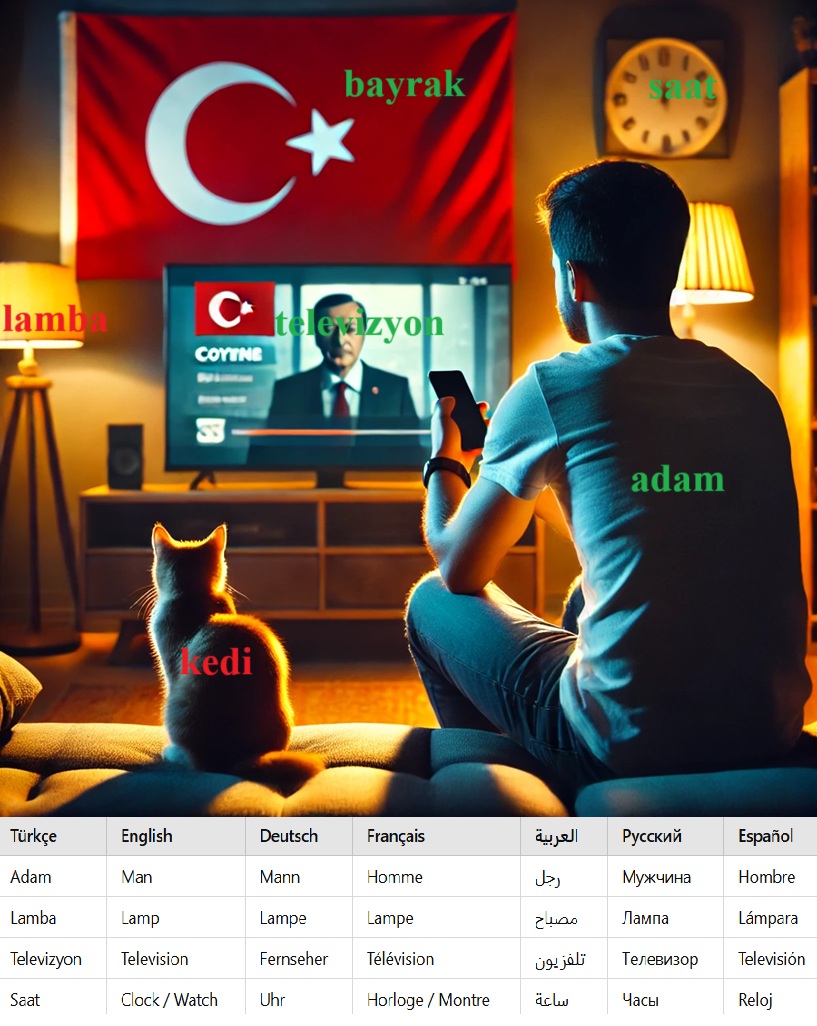Lesson 2-Section1(Combining Possession and Questions in Turkish)

Combining Possession and Questions in Turkish
Now that we’ve learned basic sentences like Benim evim (My house), Senin evin (Your house), Onun evi (His/her house), Senin araban var mı? (Do you have a car?), Evet, arabam var (Yes, I have a car), and Hayır, arabam yok (No, I don’t have a car), it’s time to combine possession with more complex questions.
Examples of Combined Sentences:
Senin evinde televizyon var mı? (Is there a TV in your house?)
Senin çantanda telefon var mı? (Is there a phone in your bag?)
Onun evinde kedi var mı? (Is there a cat in his/her house?)
How to Form These Questions:
In Turkish, we combine possession and location using suffixes. Let’s break it down:
1. Possessive Pronouns
We already know the possessive pronouns:
- Benim (my)
- Senin (your)
- Onun (his/her)
2. Possessive Suffixes
To indicate possession, we add these suffixes:
- im for benim (my)
- in for senin (your)
- i for onun (his/her)
Examples:
Benim evim (My house)
Senin evin (Your house)
Onun evi (His/her house)
3. Locative Suffix
To indicate location, we add the suffix -de or -da depending on vowel harmony:
- After front vowels (e, i, ö, ü), use -de
- After back vowels (a, ı, o, u), use -da
Examples:
Ev + de → Evinde (in your house)
Çanta + da → Çantanda (in your bag)
4. Forming Questions
Once we have the possessive and locative forms, we simply add the question structure with var mı? (is there):
Senin evinde televizyon var mı? (Is there a TV in your house?)
Senin çantanda telefon var mı? (Is there a phone in your bag?)
Onun evinde kedi var mı? (Is there a cat in his/her house?)

Table for Clarity:
| English | Turkish | Breakdown |
|---|---|---|
| Is there a TV in your house? | Senin evinde televizyon var mı? | Senin (your) + evinde (in your house) + var mı? (is there?) |
| Is there a phone in your bag? | Senin çantanda telefon var mı? | Senin (your) + çantanda (in your bag) + var mı? (is there?) |
| Is there a cat in his/her house? | Onun evinde kedi var mı? | Onun (his/her) + evinde (in his/her house) + var mı? (is there?) |
| Do you have a car? | Senin araban var mı? | Senin (your) + araban (your car) + var mı? (do you have?) |
| Yes, I have a car. | Evet, arabam var. | Evet (yes) + arabam (my car) + var (have) |
| No, I don’t have a car. | Hayır, arabam yok. | Hayır (no) + arabam (my car) + yok (don’t have) |